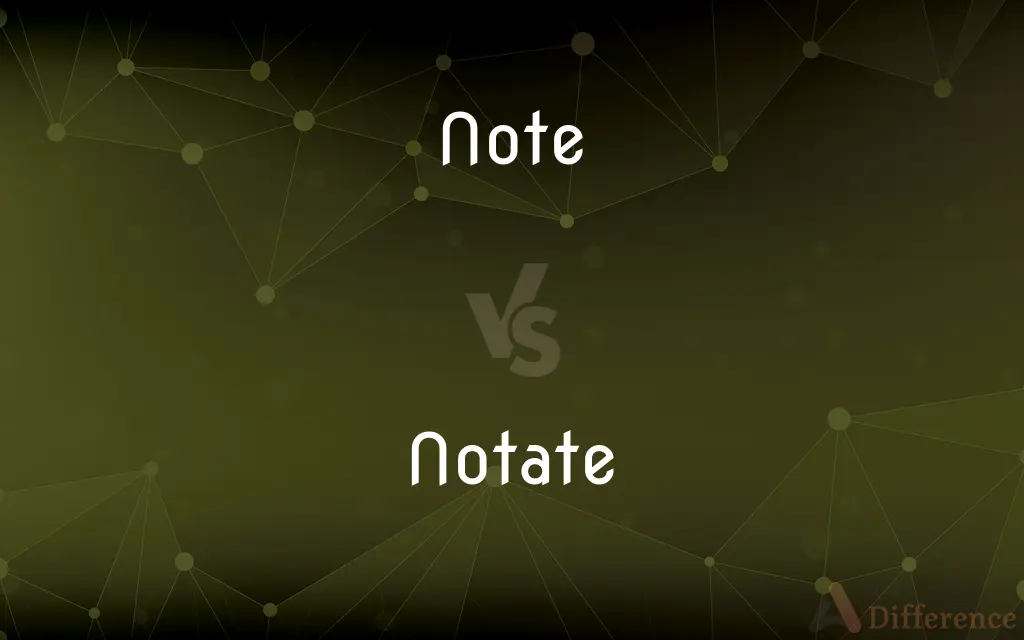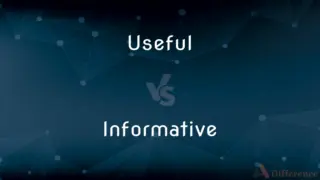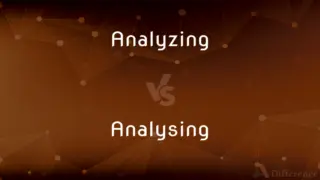Note vs. Notate — What's the Difference?
By Tayyaba Rehman — Updated on June 10, 2024
"Note" is both a noun referring to a brief record or a musical symbol and a verb meaning to observe. "Notate" is a verb meaning to set something down in a systematic way, often in symbols or writing.

Difference Between Note and Notate
Table of Contents
ADVERTISEMENT
Key Differences
The term Note is versatile in the English language. As a noun, it can describe a brief written record, perhaps of things to remember or tasks to complete. This contrasts with Notate, which is exclusively a verb that entails the act of making a note or representation, usually in a formal or systematic manner.
Note can also reference a pitch in music, representing a distinct frequency or sound. This is where Notate finds a closer connection, as one might notate music by writing down these notes, capturing melodies, rhythms, and harmonies on paper.
Additionally, Note serves as a verb meaning to observe or take notice of something. In this context, you might note a particular detail in a painting or an anomaly in a set of data. On the other hand, Notate implies the act of marking down specific symbols or signs as a means of recording information.
In essence, while Note can refer to the end product (the recorded information itself) or the act of observing, Notate specifically targets the action of documenting or symbolizing information. Notate is generally more technical and systematic in its application, while Note can be more casual and broad-ranging.
To provide clarity, if someone were observing birds, they might note their behaviors and then notate their findings in a detailed log or chart, utilizing specific symbols or shorthand for ease of future reference.
ADVERTISEMENT
Comparison Chart
Part of Speech
Both noun (record or musical symbol) and verb (observe)
Verb (to set down systematically)
Reference to Music
Represents a pitch or sound
The action of writing down musical symbols
Systematic Use
Can be casual or formal
Typically more formal and systematic
Typical Contexts
Observations, reminders, music
Charts, technical writing, musical compositions
Nature
Broader and more versatile
Specific to the act of recording
Compare with Definitions
Note
A particular pitch or sound in music.
She played a high note on the piano.
Notate
To set something down in writing, especially systematically.
He began to notate the key points of the lecture.
Note
A short informal letter.
She sent a thank you note after the interview.
Notate
To write music in the form of notation.
The composer started to notate the melody he'd created.
Note
A brief record, especially one written down to aid the memory
Took notes on the lecture.
Notate
To mark with symbols, signs, etc.
She'll notate the document with her edits.
Note
A comment or explanation, as on a passage in a text
The allusion is explained in the notes at the end of the chapter.
Notate
To represent or record in a specific way.
It's crucial to notate scientific observations accurately.
Note
A brief informal letter
Sent a note to the child's teacher.
Notate
To make a note or annotation.
Notate any allergies on the patient's chart.
Note
A formal written diplomatic or official communication.
Notate
To put into notation.
Note
A piece of paper currency.
Notate
To mark with spots or lines, which are often colored.
Note
A debt security, usually with a maturity of ten years or less.
Notate
To add notes to; to annotate
Note
A promissory note.
Notate
To create notation (e.g. music or mathematics); to record/put down in the form of notation
Note
A tone of definite pitch.
Notate
(botany) Marked with coloured spots or lines.
Note
A symbol for such a tone, indicating pitch by its position on the staff and duration by its shape.
Notate
Marked with spots or lines, which are often colored.
Note
A key of an instrument, such as a piano.
Notate
Put into notation, as of music or choreography;
Nowadays, you can notate an entire ballet; in the old days, the steps had to be memorized
Note
The characteristic vocal sound made by a songbird or other animal
The clear note of a cardinal.
Note
The sign of a particular quality or emotion
A note of despair in his remarks.
A note of gaiety in her manner.
Note
A distinctive component of a complex flavor or aroma
A full-bodied wine with notes of cherry and musk.
Note
Importance; consequence
Nothing of note happened.
Note
Notice; observation
Quietly took note of the scene.
Note
(Obsolete) A song, melody, or tune.
Note
To observe carefully; notice
Note the difference between these two plants. ].
Note
A symbol or annotation.
Note
A mark or token by which a thing may be known; a visible sign; a character; a distinctive mark or feature; a characteristic quality.
Note
A mark, or sign, made to call attention, to point out something to notice, or the like; a sign, or token, proving or giving evidence.
Note
A brief remark; a marginal comment or explanation; hence, an annotation on a text or author; a comment; a critical, explanatory, or illustrative observation.
Note
A written or printed communication or commitment.
Note
A brief piece of writing intended to assist the memory; a memorandum; a minute.
I left him a note to remind him to take out the trash.
Note
A short informal letter; a billet.
Note
(academic) An academic treatise (often without regard to length); a treatment; a discussion paper; (loosely) any contribution to an academic discourse.
Note
A diplomatic missive or written communication.
Note
(finance) A written or printed paper acknowledging a debt, and promising payment
A promissory note
A note of hand
A negotiable note
Note
(obsolete) A list of items or of charges; an account.
Note
A piece of paper money; a banknote.
I didn't have any coins to pay with, so I used a note.
Note
(extension) A small size of paper used for writing letters or notes.
Note
(music) A sound.
Note
A character, variously formed, to indicate the length of a tone, and variously placed upon the staff to indicate its pitch.
Note
A musical sound; a tone; an utterance; a tune.
Note
(by extension) A key of the piano or organ.
Note
(by extension) A call or song of a bird.
Note
(uncountable) Observation; notice; heed.
Note
(uncountable) Reputation; distinction.
A poet of note
Note
A critical comment.
Your performance was fantastic! I have just one note: you were a little flat in bars 35 and 36.
Note
(obsolete) Notification; information; intelligence.
Note
(obsolete) Mark of disgrace.
Note
That which is needed or necessary; business; duty; work.
Note
The giving of milk by a cow or sow; the period following calving or farrowing during which a cow or sow is at her most useful (i.e. gives milk); the milk given by a cow or sow during such a period.
Note
(transitive) To notice with care; to observe; to remark; to heed.
If you look to the left, you can note the old cathedral.
Note
(transitive) To record in writing; to make a memorandum of.
We noted his speech.
Note
(transitive) To denote; to designate.
The modular multiplicative inverse of x may be noted x-1.
Note
(transitive) To annotate.
Note
(transitive) To set down in musical characters.
Note
To record on the back of (a bill, draft, etc.) a refusal of acceptance, as the ground of a protest, which is done officially by a notary.
Note
To butt; to push with the horns.
Note
To notice with care; to observe; to remark; to heed; to attend to.
No more of that; I have noted it well.
The world will little note, nor long remember, what we say here, but it can never forget what they did here.
Note
To record in writing; to make a memorandum of.
Every unguarded word . . . was noted down.
Note
To charge, as with crime (with of or for before the thing charged); to brand.
They were both noted of incontinency.
Note
To denote; to designate.
Note
To annotate.
Note
To set down in musical characters.
Note
Know not; knows not.
Note
Nut.
Note
Need; needful business.
Note
A mark or token by which a thing may be known; a visible sign; a character; a distinctive mark or feature; a characteristic quality.
Whosoever appertain to the visible body of the church, they have also the notes of external profession.
She [the Anglican church] has the note of possession, the note of freedom from party titles,the note of life - a tough life and a vigorous.
What a note of youth, of imagination, of impulsive eagerness, there was through it all !
Note
A mark, or sign, made to call attention, to point out something to notice, or the like; a sign, or token, proving or giving evidence.
Note
A brief remark; a marginal comment or explanation; hence, an annotation on a text or author; a comment; a critical, explanatory, or illustrative observation.
The best writers have been perplexed with notes, and obscured with illustrations.
Note
A brief writing intended to assist the memory; a memorandum; a minute.
Note
Hence, a writing intended to be used in speaking; memoranda to assist a speaker, being either a synopsis, or the full text of what is to be said; as, to preach from notes; also, a reporter's memoranda; the original report of a speech or of proceedings.
Note
A short informal letter; a billet.
Note
A diplomatic missive or written communication.
Note
A written or printed paper acknowledging a debt, and promising payment; as, a promissory note; a note of hand; a negotiable note.
Note
A list of items or of charges; an account.
Here is now the smith's note for shoeing.
Note
A character, variously formed, to indicate the length of a tone, and variously placed upon the staff to indicate its pitch. Hence:
The wakeful bird . . . tunes her nocturnal note.
That note of revolt against the eighteenth century, which we detect in Goethe, was struck by Winckelmann.
Note
Observation; notice; heed.
Give orders to my servants that they takeNo note at all of our being absent hence.
Note
Notification; information; intelligence.
The king . . . shall have note of this.
Note
State of being under observation.
Small matters . . . continually in use and in note.
Note
Reputation; distinction; as, a poet of note.
There was scarce a family of note which had not poured out its blood on the field or the scaffold.
Note
Stigma; brand; reproach.
Note
A short personal letter;
Drop me a line when you get there
Note
A brief written record;
He made a note of the appointment
Note
A characteristic emotional quality;
It ended on a sour note
There was a note of gaiety in her manner
He detected a note of sarcasm
Note
A piece of paper money (especially one issued by a central bank);
He peeled off five one-thousand-zloty notes
Note
A notation representing the pitch and duration of a musical sound;
The singer held the note too long
Note
A comment or instruction (usually added);
His notes were appended at the end of the article
He added a short notation to the address on the envelope
Note
High status importance owing to marked superiority;
A scholar of great eminence
Note
A tone of voice that shows what the speaker is feeling;
There was a note of uncertainty in his voice
Note
A promise to pay a specified amount on demand or at a certain time;
I had to co-sign his note at the bank
Note
Make mention of;
She observed that his presentation took up too much time
They noted that it was a fine day to go sailing
Note
Notice or perceive;
She noted that someone was following her
Mark my words
Note
Observe with care or pay close attention to;
Take note of this chemical reaction
Note
Make a written note of;
She noted everything the teacher said that morning
Note
A brief written record or reminder.
I left a note for you on the fridge.
Note
An observation or comment.
He made a note of the changes to be made.
Note
A characteristic or quality.
The wine has a note of cherry and oak.
Common Curiosities
Can "note" be used as both a noun and a verb?
Yes, it can refer to a written record (noun) or the act of observing (verb).
Can I say "noting music" instead of "notating music"?
While "notating music" is more standard, "noting" can be understood in context.
Can "notate" refer to the use of symbols?
Yes, to "notate" can mean marking with specific symbols or signs.
Is "notation" related to "notate"?
Yes, "notation" is the system or method of notating, especially in music.
Does "notate" always imply a formal record?
Typically, "notate" suggests a more systematic or formalized record.
Is "annotating" a form of "notating"?
Yes, to "annotate" is to add notes or comments, a specific form of "notating."
Can a "note" be a form of communication?
Yes, it can refer to a short informal letter or message.
Can "notate" be used in scientific contexts?
Absolutely, scientists might "notate" data or observations.
Is "notate" commonly used outside of musical contexts?
Yes, it can be used in any context where information is set down systematically.
If I'm jotting down a quick reminder, which word should I use?
"Note" would be more appropriate for quick reminders.
How does a "note" in music differ from other definitions?
In music, a "note" represents a specific pitch or sound.
Are "footnote" and "note" similar?
Yes, a "footnote" is a type of "note" placed at the bottom of a page.
What's the connection between "note" and "notice"?
Both can mean to observe or pay attention, but "note" can also be a noun.
Can "note" imply importance?
Yes, to "note" something can mean giving it special attention or importance.
Is "notation" the noun form of "notate"?
Yes, "notation" refers to the method or system used to "notate" something.
Share Your Discovery

Previous Comparison
Useful vs. Informative
Next Comparison
Analyzing vs. AnalysingAuthor Spotlight
Written by
Tayyaba RehmanTayyaba Rehman is a distinguished writer, currently serving as a primary contributor to askdifference.com. As a researcher in semantics and etymology, Tayyaba's passion for the complexity of languages and their distinctions has found a perfect home on the platform. Tayyaba delves into the intricacies of language, distinguishing between commonly confused words and phrases, thereby providing clarity for readers worldwide.














































